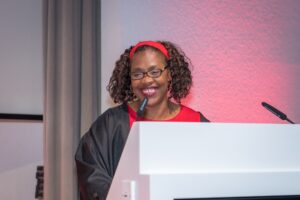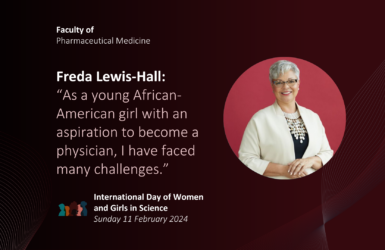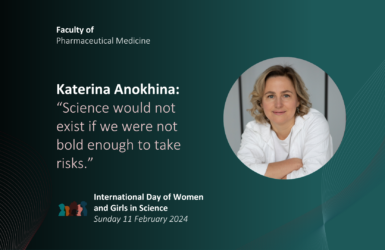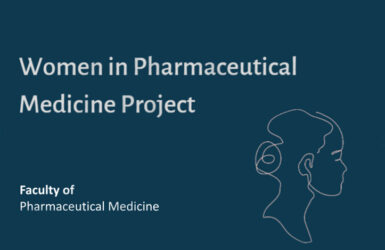Q&A with Marcia Philbin
Posted on: Friday 9 February 2024
The 2024 main theme for the International Day of Women and Girls in Science is “Women and Girls in Science Leadership, a New Era for Sustainability” with the subtheme of “Think Science … Think Peace”.
I love the sub theme because it reminds me of one of my heroines, Lt Uhuru with her fellow intrepid explorers on the Star Trek Enterprise, who surveilled the universe to discover new worlds with aim of peaceful greetings and sharing to educate as well as learn.

So other than Lt Uhuru, what else motivated me to pursue a career in science?
I was born with a disability which affected my ability to walk which meant I missed the last two years of primary school as I was in and out of hospital for operations and I had to learn to walk again twice. I gained this inner determination to succeed so when my Dad challenged me to aim high, that is exactly what I did. I decided to study science because not many girls were studying chemistry, physics or maths and I wanted to be different.
How have you navigated and overcome gender-related challenges in your journey?
I have four brothers and when I was growing up, the neighbours on both side had three boys each so not surprisingly, I was a bit of a tomboy and thought I was just as capable as the boys so use to played tip and run cricket with them and did not worry about getting dirty. It was only when I went to a girls only secondary school that I got in touch with my feminine side. The school fortunately offered chemistry, physics and biology so studying the sciences was encouraged, though the teachers had strange ideas of what black girls were capable but that is another story! My first experience of gender related challenges happened when I started work – I turned up and they assumed I was the new clerk rather than a research chemist. It was downhill from that point! It has been a feature of my career – I am black and female so labels are immediately given to me when I show up. The best way I have dealt with this is to let my knowledge and achievements speak for themselves.
Can you share a specific instance where your gender may have presented a challenge, and how you tackled it to continue progressing in your career?
There was a horrible incident which happened when I was working in the lab. I was cornered and called a host of misogynistic names by a male colleague who was jealous of my achievements. There was another male colleague present but he kept his back turned and did not come to my aid. Afterwards, I went to the line manager and told him what had happened. He told me that I was oversensitive and did nothing. I was emotionally distressed and had no-one to turn to. It was then I knew I had to leave. I have never felt so isolated or alone as I did then. Thankfully, several weeks later, there was a reorganisation and the new male leader interviewed me and then promoted to be the group leader for 50 scientists and engineers with budget of £4M. The lesson I took from that is no matter how dark or despairing things appear, it will not last and someone will see YOU for who you are and for what you are capable so do not give up.
What changes or advancements do you hope to see for women in science over the next decade, and how can we collectively work towards achieving these goals?
A key advancement will be to see more women in leadership positions to help address the global and societal challenges of climate change and economic disparity. Women will bring a different dynamic to the discussions and in my view, are more willing to work collegiately for the greater good. More diverse voices from female leaders in low to middle-income countries are needed because the status quo of the rich nations dominating the discourse is not working for the global majority. The COVID-19 pandemic illustrated this because when it came time to hand out the vaccines, it was the poorest who were back of the queue. Fearless pioneers like the Kenyan Wangari Maathai were leading the way on climate change when she founded the Green Belt Movement and became the first African woman to win the Noble Prize for Peace. The incomparable social justice warrior and Prime Minister of Barbados, Mia Mottley, was awarded the UN’s Champion of the Earth Award in 2021 for leading the development of her country’s ambitious plan to phase out fossil fuels by 2030.
What message would you like to convey to women and girls aspiring to make their mark in the field of science?
Historically, science has been framed as the purview of white men with a few token white women who could not be ignored thrown in. However, scientific advancements were made also across the African and Asian continents by both men and women for centuries.
It is time that the narrative on science was broadened to include those groups who for too long have been ignored and marginalised. So I would like to see women step forward and own their own voice rather than be an appendage to men which has been the case for too long.
It is time for women to speak for themselves and advocate on behalf of one another. The time is now for women to reach out to support one another because we are not an amorphous mass. Race, ethnicity, culture and socioeconomic background means that we have individual inherent experiences and biases which affects our confidence and attitudes so we should be honest about this. It is time for women to be themselves and stop aping men. Science has been framed predominantly in the image of white men with a few token white women like Marie Curie who could not be ignored. It is time trailblazing black, Asian as well as white women openly celebrate their achievements and not be embarrass or coy about it.
On this special day, we want to celebrate your achievements. Can you share a project or accomplishment that you are particularly proud of during your career in science?
There have been many accomplishments, but I always think back to the very first project which I led when I was working for the Ministry of Defence (MoD). I submitted a proposal to develop multi-functional materials for a specific reason which I cannot reveal. My proposal was shortlisted and I was one of 32 proposals which was presented to the MoD customer. It was one of the best presentations I have ever done and at the end, the chair asked if I had any further answers to the questions and the panel all laughed! I learned a few weeks later that I had been awarded £750k for a three year project and this was only 18 months after I had finished my PhD. I am really proud of that project because it was my idea, I wrote the proposal, I won the funding, I led the project and I funded five students who achieved their PhDs in chemistry. Not bad for a working class kid of immigrant parents whose schooling finished when they were about 10 years old.






